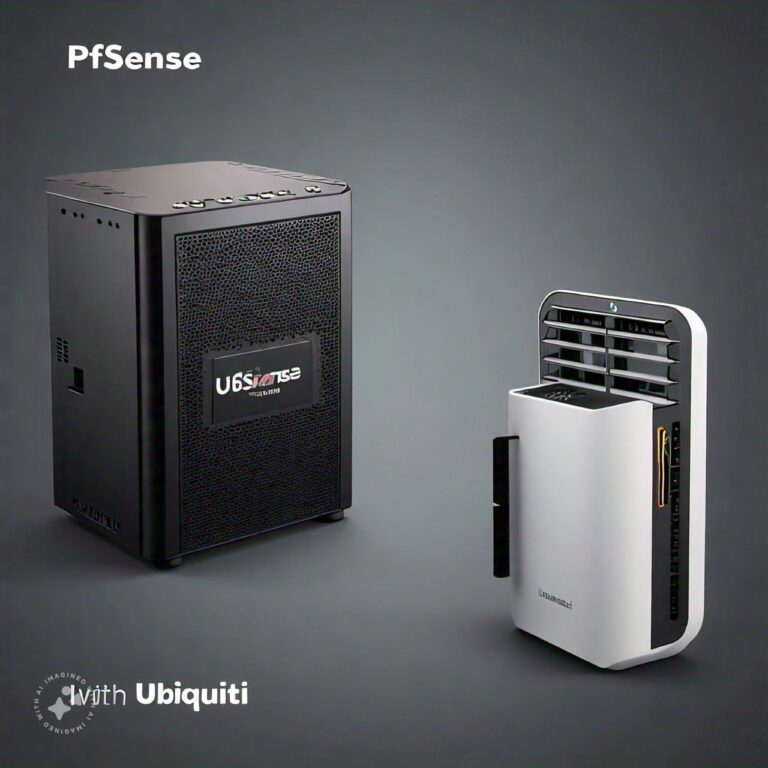
Differences Between pfSense and Ubiquiti
pfSense and Ubiquiti are two popular networking solutions, each offering unique capabilities for managing and securing networks. pfSense is an open-source firewall and router software based on FreeBSD, widely used by businesses and network administrators for advanced security and network management. It allows users to convert a standard PC into a powerful firewall/router appliance, offering a wide range of features such as VPNs, load balancing, traffic shaping, and deep packet inspection. With its open-source nature, pfSense is highly customizable, making it a popular choice for those seeking full control over their network security and traffic management.
On the other hand, Ubiquiti is a networking hardware manufacturer best known for its UniFi product line, which includes wireless access points, switches, routers, and a centralized management platform. Ubiquiti offers both consumer and enterprise-grade networking solutions that are scalable, user-friendly, and designed to be managed through a centralized platform. While pfSense is focused more on security and network control, Ubiquiti emphasizes ease of use, scalability, and seamless integration between different network devices, making it a popular choice for both home users and small-to-medium-sized businesses.
pfSense Overview
pfSense is a robust open-source firewall and router software used for network security and management. Below are five key aspects of pfSense.
1. What is pfSense?
pfSense is an open-source firewall/router operating system that can be installed on standard PC hardware, turning it into a powerful and flexible network security appliance. It is based on FreeBSD and provides comprehensive firewall protection, routing capabilities, VPN, and traffic management features. One of pfSense’s key strengths is its flexibility and the level of control it offers, allowing administrators to configure highly customized network solutions based on their specific needs. It is popular among small businesses, educational institutions, and tech-savvy individuals who require fine-grained control over their network environments.
- Open-Source Firewall: A free, flexible firewall/router solution based on FreeBSD.
- Comprehensive Control: Offers advanced control and customization for network management.
2. Security Features
pfSense offers a rich set of security features that make it a popular choice for those who need robust network protection. It includes stateful firewall capabilities, Intrusion Detection and Prevention (IDS/IPS), and VPN support for securing remote connections. The firewall rules are highly customizable, allowing administrators to create detailed policies based on traffic type, source, and destination. pfSense also supports deep packet inspection (DPI), helping identify and block malicious traffic before it can compromise the network.
- Stateful Firewall: Provides granular control over incoming and outgoing traffic.
- IDS/IPS and VPN: Protects against intrusions and secures remote connections.
3. Routing and Networking Features
Beyond security, pfSense offers advanced routing features, including dynamic routing protocols like BGP, OSPF, and RIP, as well as load balancing and traffic shaping to optimize network performance. pfSense can also act as a DHCP server, providing IP address management, and supports NAT (Network Address Translation), allowing multiple devices to share a single public IP. Its powerful routing capabilities make it ideal for complex network environments.
- Dynamic Routing: Supports BGP, OSPF, and RIP for flexible routing configurations.
- Load Balancing and Traffic Shaping: Optimizes network traffic for better performance.
4. Customization and Add-Ons
One of the strengths of pfSense is its modularity. Users can install additional packages and plugins to extend the functionality of the system, such as Snort for intrusion detection, Squid for web caching, and pfBlockerNG for ad and malware blocking. These features allow administrators to tailor their network solution based on specific requirements, making pfSense highly customizable.
- Customizable Packages: Install add-ons like Snort, Squid, or pfBlockerNG.
- Modularity: Extend the core functionality with a wide range of plugins.
5. Cost and Accessibility
Since pfSense is an open-source solution, it is free to use, making it highly attractive to budget-conscious users. However, while pfSense provides powerful features, it requires more technical expertise to configure and manage than many other firewall and router solutions. Although there are commercial options for dedicated hardware appliances with pfSense pre-installed (Netgate devices), the software itself remains free, with paid support options available.
- Open-Source and Free: A cost-effective solution for advanced network security.
- Requires Technical Expertise: Suitable for users with networking knowledge.
Ubiquiti Overview
Ubiquiti is a networking hardware manufacturer known for its UniFi product line, offering scalable and user-friendly solutions for managing networks. Below are five key aspects of Ubiquiti.
1. What is Ubiquiti?
Ubiquiti is a company that designs and manufactures networking hardware, including wireless access points, routers, switches, and security gateways. The most notable product line, UniFi, provides a comprehensive ecosystem for managing network devices through a centralized platform, the UniFi Controller. Ubiquiti products are designed to be scalable, allowing users to expand their networks easily by adding more devices. UniFi is popular for providing enterprise-grade features at a more affordable price, making it accessible to small businesses, homes, and even larger enterprises.
- Networking Hardware Manufacturer: Specializes in wireless access points, routers, and switches.
- UniFi Ecosystem: Provides a unified platform for managing network devices.
2. Ease of Use and Management
One of the key advantages of Ubiquiti UniFi is its ease of use. The UniFi Controller software provides a graphical user interface that simplifies the management of multiple network devices. Users can configure, monitor, and manage their entire network from a single interface, making it easy to set up and deploy new devices. This centralized management approach eliminates the need for manual configuration of individual devices and allows for a seamless networking experience.
- User-Friendly Interface: The UniFi Controller offers a simple and intuitive interface.
- Centralized Management: Manage all network devices from a single platform.
3. Wireless Networking Performance
Ubiquiti is well known for its high-performance wireless networking products, especially its UniFi Access Points (APs). These access points are designed to provide strong and reliable Wi-Fi coverage, especially in environments with high demand, such as offices, hotels, and campuses. Ubiquiti’s wireless solutions support advanced features like mesh networking, which allows multiple APs to work together to provide seamless wireless coverage across large areas.
- High-Performance Wi-Fi: UniFi APs deliver strong, stable wireless coverage.
- Mesh Networking: Supports seamless coverage across multiple access points.
4. Security Features
While Ubiquiti is known more for its ease of use and scalability, it also offers important security features. The UniFi Security Gateway (USG) provides basic firewall protection, VPN support, and threat management. While not as feature-rich as pfSense, Ubiquiti’s security features are sufficient for small-to-medium businesses and home users. Users can configure security settings directly through the UniFi Controller, making it easy to set up and monitor.
- Basic Security: Includes firewall protection and VPN support.
- Threat Management: Provides basic network security tools.
5. Scalability and Affordability
Ubiquiti UniFi products are designed to be scalable, making them ideal for businesses that need to expand their networks over time. The UniFi ecosystem allows users to add more devices as needed without having to reconfigure the entire network. In terms of pricing, Ubiquiti is known for offering affordable networking solutions compared to traditional enterprise brands like Cisco. This makes it an attractive option for businesses that need reliable networking without breaking the bank.
- Scalable Solutions: Easily expand networks by adding more devices.
- Affordable Enterprise Features: Offers professional-grade networking at a lower price.
Differences Between pfSense and Ubiquiti
- Software vs. Hardware
- pfSense: A software-based solution that can be installed on generic hardware.
- Ubiquiti: Primarily a hardware manufacturer offering networking devices like routers, switches, and access points.
- Customization
- pfSense: Highly customizable with support for additional packages and plugins.
- Ubiquiti: Offers limited customization but focuses on ease of use and management.
- User Interface
- pfSense: Web-based interface with advanced settings for network professionals.
- Ubiquiti: UniFi Controller offers a user-friendly interface for centralized network management.
- Target Audience
- pfSense: Aimed at network administrators and IT professionals who need deep control over network security.
- Ubiquiti: Targets small businesses, home users, and enterprises looking for scalable, easy-to-use solutions.
- Security Features
- pfSense: Advanced security features like IDS/IPS, deep packet inspection, and extensive firewall rules.
- Ubiquiti: Basic firewall and VPN functionality through the UniFi Security Gateway.
- Scalability
- pfSense: Scalable in terms of feature expansion via software, but scaling hardware requires additional PCs or appliances.
- Ubiquiti: Easily scalable by adding more devices to the UniFi ecosystem.
- Cost
- pfSense: Free to use as open-source software, with paid options for hardware appliances.
- Ubiquiti: Hardware costs are typically lower than traditional enterprise solutions, but still come at a price.
- Performance
- pfSense: Performance depends on the hardware it’s installed on, allowing for high-performance configurations.
- Ubiquiti: Designed to be high-performing out of the box, especially for wireless networking.
- Management Complexity
- pfSense: Requires more technical expertise to configure and manage.
- Ubiquiti: Designed to be user-friendly, making it accessible to users with less technical expertise.
- Hardware Independence
- pfSense: Can be installed on any compatible hardware, offering flexibility.
- Ubiquiti: Requires Ubiquiti hardware for use, which limits hardware flexibility.
Conclusion
pfSense and Ubiquiti are both excellent networking solutions, but they serve different purposes and target different types of users. pfSense is an open-source firewall and router software designed for users who require advanced network security and customization. It offers a wide range of features, including deep packet inspection, VPN support, and intrusion detection, making it suitable for businesses and advanced users who need granular control over their network environment. However, it requires more technical expertise to configure and manage.
In contrast, Ubiquiti offers a hardware-centric solution through its UniFi product line, which provides enterprise-grade features in an easy-to-use, scalable package. Ubiquiti’s focus on simplicity and centralized management makes it an ideal choice for small-to-medium-sized businesses and home users who need a reliable, scalable network solution without the steep learning curve of pfSense.
Choosing between pfSense and Ubiquiti depends on your specific needs. If you are looking for deep customization and security control, pfSense is the better option. However, if ease of use, scalability, and an integrated hardware ecosystem are your priorities, Ubiquiti is likely the right choice. Both platforms have their strengths, and understanding their differences will help you make the best decision for your network infrastructure.
FAQs
Related Topics
- All
- Animals
- Diseases
- Health
- Money
- Politics
© 2024 OnYelp.com. All rights reserved. Terms and Conditions | Contact Us | About us





